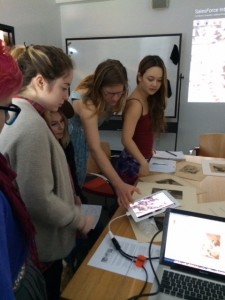 There is a great story about Karen Koehler’s Guernica tutorial in the October 20th post to The Harold. Read about it and ask Karen or Asha if you think this technology would serve you!
There is a great story about Karen Koehler’s Guernica tutorial in the October 20th post to The Harold. Read about it and ask Karen or Asha if you think this technology would serve you!
Send your teaching stories to ctl.hampshire.edu!
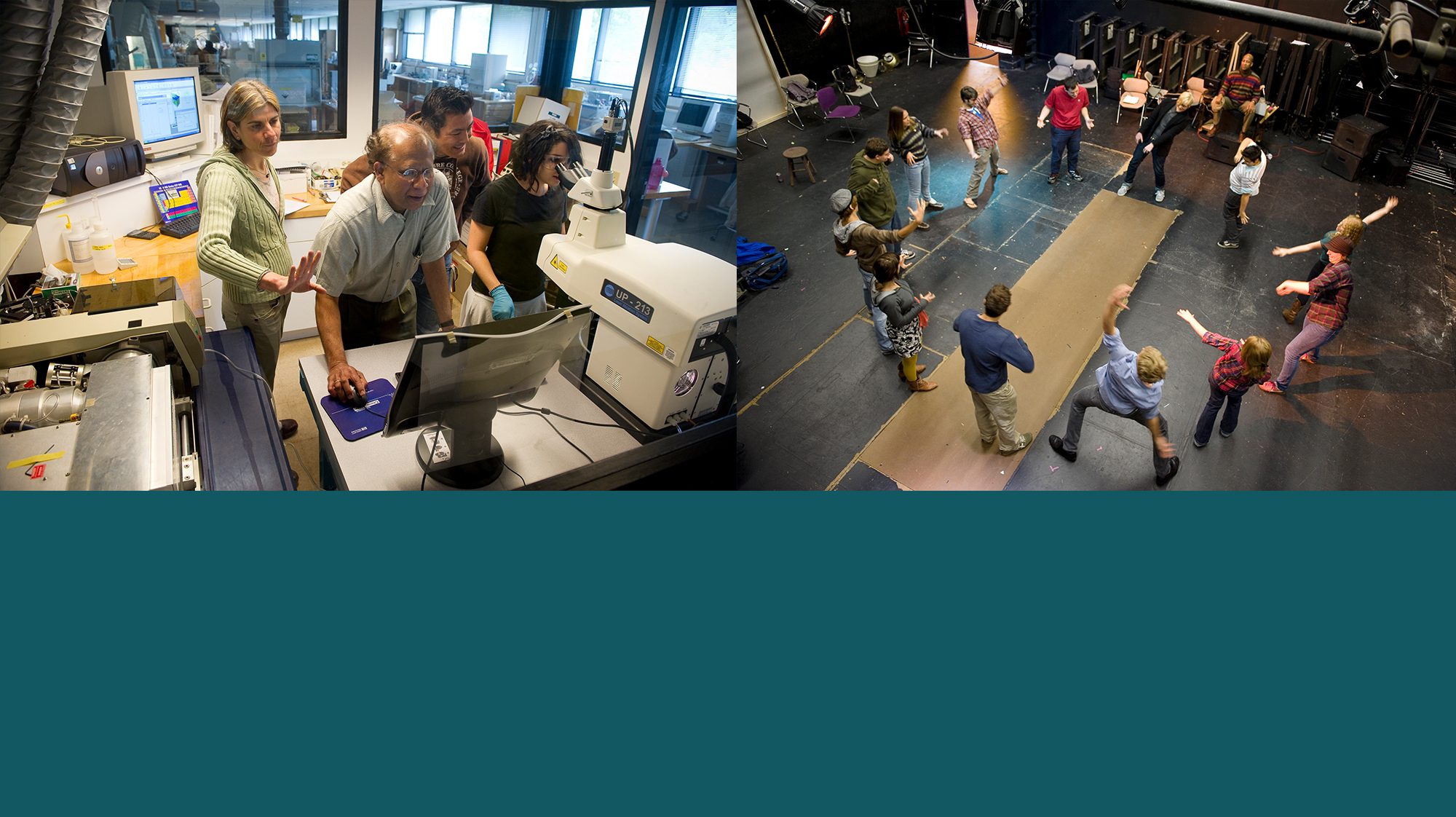

Center for Teaching and Learning
Fostering open exchange about teaching and learning among faculty and staff at Hampshire College
 There is a great story about Karen Koehler’s Guernica tutorial in the October 20th post to The Harold. Read about it and ask Karen or Asha if you think this technology would serve you!
There is a great story about Karen Koehler’s Guernica tutorial in the October 20th post to The Harold. Read about it and ask Karen or Asha if you think this technology would serve you!
Send your teaching stories to ctl.hampshire.edu!
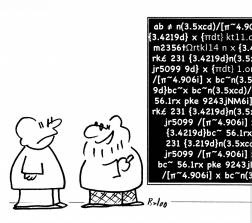
After a five-minute Google search for “grant writing cartoons,” it became very clear that applying for grants gets a bad rap. It’s true—grant writing can be an arduous, tedious process, in which you can put forth tremendous effort with potentially little return. Writing a grant proposal is very much like preparing for a big life event (a wedding, a major trip, or having a child). You plan. You stress. You dedicate tremendous time to make sure everything is perfect. And then your great aunt complains that her piece of the wedding cake was stale. Or your friend looks at the photos from your trip to Europe and tells you that his trip to Europe took a more original, “off the beaten path” approach. All your planning and care seems to fly out the window and what you’re left with is dismay and disappointment.
And you know what? It can hurt. Hearing that your proposal was not selected for funding can be a real drag, but it can also present you with a learning opportunity. We’ve been told by many Hampshire faculty who are new to grant seeking that they don’t “get grant writing” and that it seems like “some sort of mystical thing that doesn’t make sense” to them. Good news: Grant writing doesn’t have to be nebulous.
One of the best ways to learn why certain grants get funded is to serve on a grants review panel. There are many government agencies who are constantly looking for peer reviewers (and most pay a stipend!) for grant applications. In turn, you get the chance to see how grant proposals are evaluated, giving you key insights into approaches to your own proposal writing. Being a peer reviewer on a grants panel is also a great addition to your CV!
Here are a few opportunities for you to consider:
There are 2 new resources for your Div II and III students that bring together resources, tips, event announcements, and reminders. Have your students visit the sites at:
First year students have the new programs page (sites.hampshire.edu/newtohamp).
There are prizes for students who visit. If you have tips you would like to post on the Div 2 and 3 sites, send them on to me at lwenk@hampshire.edu.
Best Practices for Supporting the Success of First Generation College Students
Tuesday, October 21, 3:30pm-5:00pm, FPH Lounge
This year, one in seven of Hampshire’s entering class is a first generation college student. This percentage will continue to climb over the coming years. Students who are the first in their families to attend college have meaningful experiences, knowledge, and skills to contribute to Hampshire and to their own learning. However, first generation college students also have unique challenges navigating the college environment, particularly Hampshire’s learner-centered academic approach. Faculty attending this session will learn about challenges faced by many first generation college students and share advising strategies and teaching practices to support their academic success.
This Talking about Teaching session will be facilitated by:
Kristen Luschen, Dean of Multicultural Education & Inclusion/Assoc. Professor Education Studies
Vivianna Alvarez, First Gen Student Group, Signer/Division II student
Event sponsored by: The Hampshire College Center for Teaching and Learning
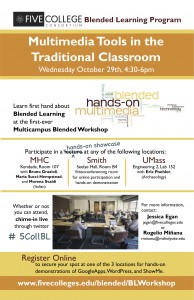 The Five College Blended Learning Program invites you to the first-ever Multicampus Blended Workshop:
The Five College Blended Learning Program invites you to the first-ever Multicampus Blended Workshop:
Multimedia Tools in the Traditional Classroom
Wednesday October 29th, 4:30-6pm
Participate in a hands-on showcase at any of the following locations:
MHC
Kendade, Room 107
with Morena Svaldi, Maria Succi-Hempstead, and Bruno Grazioli
(Italian, MHC and Smith)
UMass
Engineering 2, Lab 152
with Eric Poehler,
(Archaeology, UMass)
Smith
Seelye Hall, Room B4
Videoconferencing room for online participation and hands-on demonstration
Whether or not you can attend, chime-in live through twitter # 5CollBL.
Register Online to secure your spot at one of the 3 locations for hands-on demonstrations of GoogleApps, WordPress, and ShowMe: www.fivecolleges.edu/blended/BLWorkshop
For more information, contact Jessica Egan (jegan@fivecolleges.edu) or Rogelio Miñana (rminana@mtholyoke.edu)
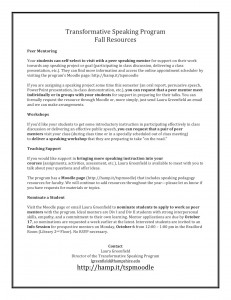 The Transformative Speaking Program has resources available to you and your students this semester. Please visit the program’s Moodle page at http://hamp.it/tspmoodle for more information about the highlights listed below:
The Transformative Speaking Program has resources available to you and your students this semester. Please visit the program’s Moodle page at http://hamp.it/tspmoodle for more information about the highlights listed below:
1. You can request that a peer mentor meet with your students to work on developing skills for class discussion or presentations.
2. You can request that a team of peer mentors lead a speaking workshop for your students, during or outside of your class time.
3. Students can self-select to meet one-on-one with a peer speaking mentor to work on their general speaking skills or a particular discussion or presentation.
4. You can nominate students to apply to work as peer mentors for next year (application deadline Oct 17 and rolling thereafter).
5. You can request that a peer mentor be dedicated to work exclusively with you and students in your 100-level spring 2015 course in any discipline.
Questions? Contact Laura Greenfield at lgreenfield@hampshire.edu
 The Chronicle of Higher Ed has launched Vitae. It is the only online career hub dedicated to faculty and administrators with the goal of helping them with all aspects of their jobs. Vitae offers free career management tools, community, insights about teaching, scholarship, and life in academia.
The Chronicle of Higher Ed has launched Vitae. It is the only online career hub dedicated to faculty and administrators with the goal of helping them with all aspects of their jobs. Vitae offers free career management tools, community, insights about teaching, scholarship, and life in academia.
Visit the FAQ to learn more about Vitae.